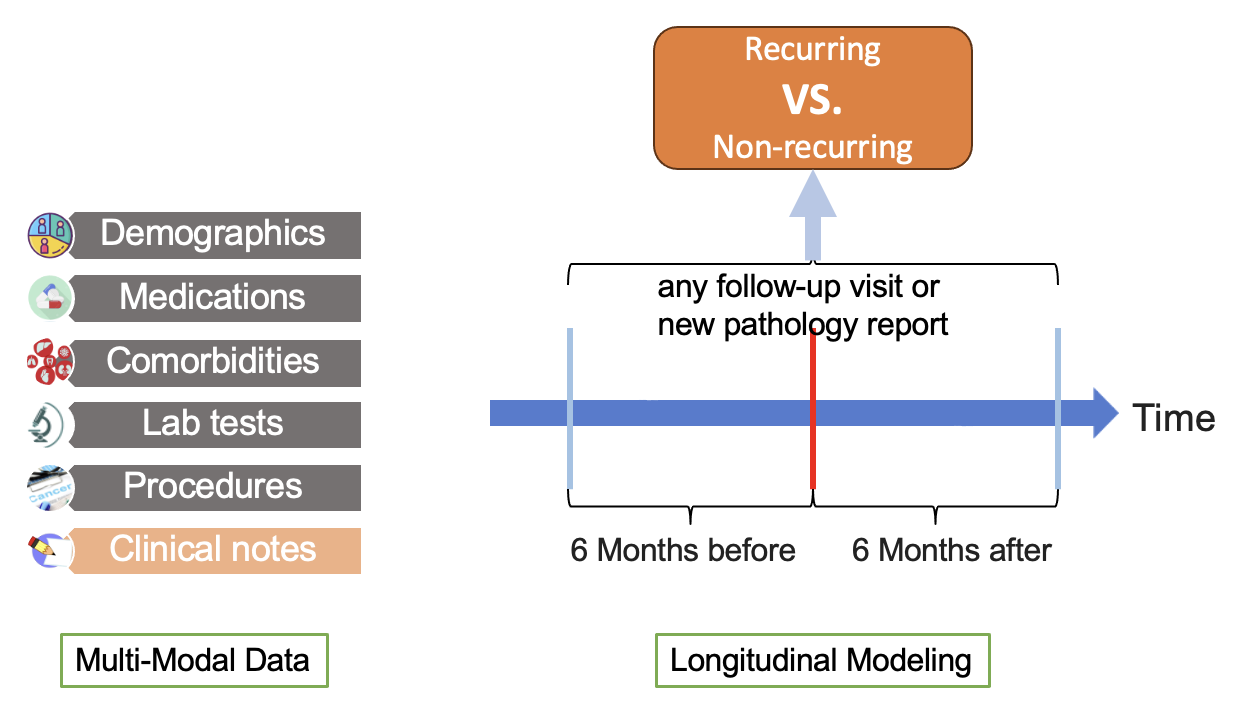AI2Equity: AI Integrating Social Determinants of Health to Advance Health Equity in Cardiovascular Risk Prediction
NIH/NHLBI R01 R01HL171599 (04/01/2024 – 03/31/2028)
AI2Equity aims to explore advanced AI techniques for accurate, equitable, interpretable and generalizable CVD risk prediction. We will integrate comprehensive social determinants of health (SDoH) information, assess AI models's fairness, and explore bias mitigation algorithms for fair learning across different demographic subgroups.

ADAPT: Automated, Data-driven, AdaPtable, and Transferable learning for suicide risk prediction
NIH/NIMH R34 P50MH129701-5212 (04/05/2023 – 03/31/2028)
| This project aims to address the translation gap from research to clinical practice by systematically assessing and improving a suicide risk algorithm’s generalizability and adaptability from an original development setting to a new healthcare system. |
 |
DETERMINE: Diabetes prEdicTion and Equity through Responsible MachINe lEarning
NIH AIM-AHEAD 1OT2OD032581-02-348 (9/17/2023 - 9/16/2025)
| We will develop an AI-powered multivariable risk prediction model to integrate social, demographic, and clinical factors for accurate, fair, generalizable, and interpretable T2D risk prediction (i.e., DETERMINE). |
 |
Applying Deep Learning for Predicting Retention in PrEP Care and Effective PrEP Use among Key Populations at Risk for HIV in Thailand
NIH/NIMH R03MH130275 (7/1/2023 - 6/30/2025)
| We will explore advanced machine learning techniques for identifying protective and risk factors for retention in PrEP care and effective PrEP use among key populations (men who have sex with men and transgender women) in Thailand. |
 |
DeepCertainty: Deep Learning for Contextual Diagnostic Uncertainty Measurement in Radiology Reports
NIH/NLM R21LM014032 (9/1/2023 - 8/30/2025)
| This project aims to develop a deep learning-based approach for context-aware (un)certainty assessment (DeepCertainty), which is end-to-end trainable, calibratable, generalizable, scalable, and explainable. It would allow for fine-grained uncertainty measurement and standardization, facilitate consistent and accurate diagnostic certainty communication in CTPA reports and thus improve PE care. This study will build the foundation for future implementation and integration of DeepCertainty into clinical workflows to prompt real-time low-certainty alerts for improving PE diagnostic reporting quality and clarity, which will inform better treatment decisions for ED patients with suspected PE. |
 |
Identifying Recurrent Non-Hodgkin Lymphoma in Electronic Health Data
NIH/NCI R21CA269425 (9/1/2022- 3/31/2025)
| We will develop innovative computational methods to efficiently and accurately identify recurrent NHL in electronic health data. It is the first step towards large-scale, population-based analyses of this important yet understudied patient outcome. |
 |